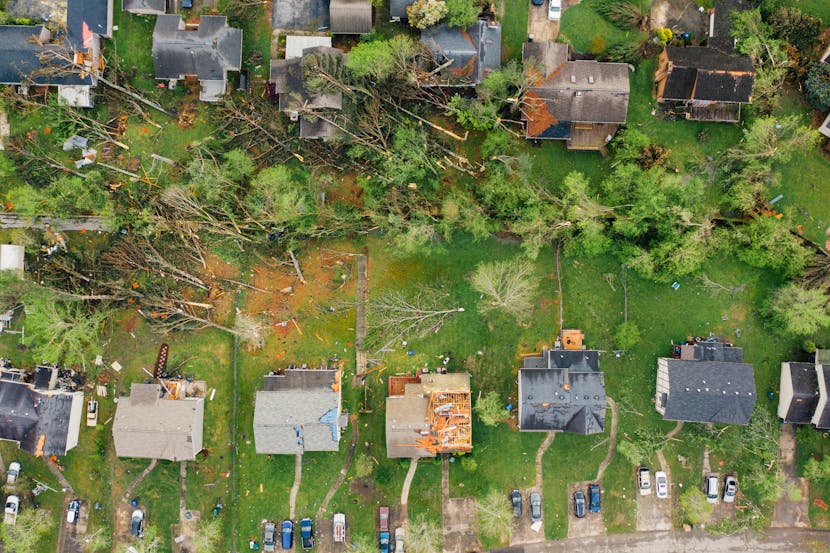A massive tornado outbreak is set to disrupt travel and endanger lives across the central and southern United States this weekend, affecting over 100 million people from the Dakotas to the Carolinas. As severe storms threaten major cities, travelers face flight cancellations, delays, and hazardous conditions.
US Travel Alert: Dakotas, Minnesota, Wisconsin, Nebraska, Iowa, Illinois, Michigan, Ohio, Tennessee, St. Louis, Chicago, Nashville, New Orleans, Atlanta, West Virginia, Georgia, and Carolinas Set to Experience Another Powerful Tornado Affecting More than One Hundred Million People, Need To Know for Weekend Trip

Key Takeaways:
- A significant tornado outbreak is expected to affect over 100 million people across central and southern U.S.
- Severe storms will bring damaging tornadoes, strong winds over 70 mph, large hail, and torrential rain.
- Major travel disruptions are anticipated, including flight cancellations, airline delays, road closures, and cruise interruptions.
- Major cities like St. Louis, Chicago, Nashville, New Orleans, and Atlanta are in the storm’s path.
- Travelers are advised to stay informed, be flexible with plans, and prioritize safety.
Massive Tornado Threat Looms Over Central U.S., Impacting 100 Million
A Weekend of Severe Weather Across Multiple States
A significant and potentially devastating tornado outbreak is set to impact a vast portion of the central and southern United States from Friday through Sunday, affecting more than 100 million people across multiple states. Areas from the Dakotas and Minnesota down to the Carolinas are bracing for severe storms that will bring damaging tornadoes, strong winds, large hail, and torrential rain.
Major Cities in the Storm’s Path
Major metropolitan areas such as St. Louis, Chicago, Nashville, New Orleans, and Atlanta are directly in the storm’s path. These cities, along with others in states including Wisconsin, Nebraska, Iowa, Illinois, Michigan, Ohio, Tennessee, West Virginia, Alabama, Georgia, Mississippi, and the Carolinas, are preparing for what could be a historic weather event.
Unusual Weather Patterns Extend Risk
The storm’s northern reach is particularly unusual for this early in the season. States that recently experienced freezing temperatures and snow—such as the Dakotas, Minnesota, and Wisconsin—will now face the risk of severe thunderstorms. Meteorologists warn that the severe weather outbreak will stretch across 500,000 square miles.
Travel Disruptions Anticipated Nationwide
Airline Delays and Flight Cancellations
The aviation industry is already preparing for substantial disruptions. As violent storms bring powerful wind gusts and possible tornado activity, major airports in storm-affected cities could experience extensive flight cancellations and delays. The Federal Aviation Administration (FAA) has issued a severe weather advisory, warning of widespread turbulence, rerouted flights, and possible ground stops at major travel hubs.
Impact on Road and Maritime Travel
Road travelers should anticipate reduced visibility, potential flash flooding, and dangerous driving conditions. The severe weather may also impact cruise operations along the Gulf Coast, with port closures and delayed departures likely as strong winds and storm surges create hazardous maritime conditions.
Increased Tornado Risk Raises Safety Concerns
Nighttime Tornadoes Add Danger
The risk of multiple tornadoes will escalate throughout the weekend, particularly in Missouri, central and southern Illinois, and northern Arkansas. The tornado threat will extend into the nighttime hours, increasing the danger for those in vulnerable locations. Reduced visibility at night makes it harder for residents and travelers to respond quickly.
Safety Recommendations for Travelers
Travelers in affected areas should remain vigilant, review emergency procedures, and ensure they have access to real-time weather updates. It is advised to stay indoors when possible and avoid unnecessary travel in high-risk areas during peak storm activity.
Powerful Winds and Hail Pose Additional Hazards
Potential for Widespread Damage
Strong winds, potentially exceeding 70 mph, could bring widespread damage to homes, hotels, and tourist attractions. Power outages are a significant concern, with thousands of properties likely to experience blackouts. Large hail, possibly reaching the size of golf balls, may also develop in the strongest storms.
Precautions to Mitigate Risks
Visitors should prepare for disruptions by keeping emergency supplies, such as flashlights, portable chargers, and bottled water, readily available. Those using personal vehicles should take precautions to prevent hail damage, such as parking under covered structures or delaying travel until storms pass.
Impact on Tourism and Local Businesses
Disruptions to Popular Destinations
Popular tourism destinations, including Chicago’s Magnificent Mile, Nashville’s Broadway, and New Orleans’ French Quarter, could see reduced foot traffic due to severe storms. Outdoor events and festivals may face cancellations, while museums and indoor attractions might see an influx of visitors seeking shelter from extreme weather.
Economic Implications for the Tourism Industry
The severe weather poses significant challenges for the tourism industry, with airlines, hotels, and local businesses bracing for potential losses due to cancellations and decreased patronage.
Staying Safe and Informed During the Storm
Monitor Updates and Adjust Plans Accordingly
Travelers should stay updated through airline notifications, weather alerts, and local travel advisories. Major carriers have issued travel waivers for passengers flying through affected regions, and flexible rebooking options may be available.
Essential Safety Measures
- Download emergency weather apps for real-time updates.
- Check with airlines and transportation providers for schedule changes.
- Avoid unnecessary travel during peak storm activity.
- Ensure accommodations have emergency plans in place.
- Keep emergency supplies readily accessible.
Looking Ahead: Potential for Extended Disruptions
As the storm system moves eastward, additional disruptions may occur in states along the Atlantic coastline. The risk of heavy rainfall, flash flooding, and strong winds may extend into the Carolinas, Virginia, and Georgia. Travelers with upcoming trips to storm-affected regions should remain flexible, stay informed, and prioritize safety as this severe weather event unfolds.











